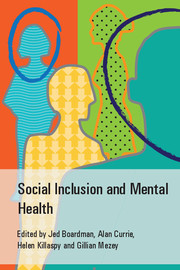Book contents
- Frontmatter
- Contents
- List of contributors
- List of tables, boxes and figures
- Foreword
- Preface
- Acknowledgements
- Scoping Group on Social Inclusion, Royal College of Psychiatrists
- Part 1 What is social exclusion?
- Part 2 Social exclusion: the scope of the problem
- Part 3 Working towards inclusive psychiatry
- Index
Preface
Published online by Cambridge University Press: 01 January 2018
- Frontmatter
- Contents
- List of contributors
- List of tables, boxes and figures
- Foreword
- Preface
- Acknowledgements
- Scoping Group on Social Inclusion, Royal College of Psychiatrists
- Part 1 What is social exclusion?
- Part 2 Social exclusion: the scope of the problem
- Part 3 Working towards inclusive psychiatry
- Index
Summary
The origins of this book lie in the unpublished report written by the Social Inclusion Scoping Group of the Royal College of Psychiatrists. The Scoping Group was set up to examine the nature and extent of social exclusion in people with mental health problems and those with learning disabilities, the implications for the future organisation, structure and culture of mental health and learning disability services and for the practice and training of psychiatrists. The report was published in a shortened form as a position statement which summarised the findings and views of the Scoping Group (Royal College of Psychiatrists, 2009). The evidence amassed by the Group and their deliberations were considered too good to waste and have been adapted to produce this book, aimed primarily at psychiatrists but also of relevance to other mental health professionals and others working in mental health services. It should also be of value to those who have an interest in mental health policy and anyone who cares about the plight of those more vulnerable members of our society.
Included in the Scoping Group review was the full range of people with different diagnoses represented by the specialties within the Royal College of Psychiatrists, including learning disability, drug and alcohol problems, children and adolescents, older adults and mentally disordered offenders. In addition, people who have comorbid diagnoses such as psychotic or non-psychotic mental illness, alcohol and/or drug dependence, learning disability, personality disorder and adult neurodevelopmental disorders (Asperger's syndrome, autism, attention-deficit hyperactivity disorder) are included. The review also covered the full range of age groups and social identities – women, people from Black and minority ethnic groups, lesbian, gay and bisexual people, and faith groups. Most of these groups are represented by the various Faculties, Sections and Special Interest Groups of the College and they parallel many groups covered in the Equalities Review (2007). In addition, specific groups, including the homeless, refugees and asylum seekers with mental health problems, were highlighted by the Scoping Group as they are, by the nature of their circumstances, excluded by society.
- Type
- Chapter
- Information
- Social Inclusion and Mental Health , pp. xii - xiiiPublisher: Royal College of PsychiatristsPrint publication year: 2010

